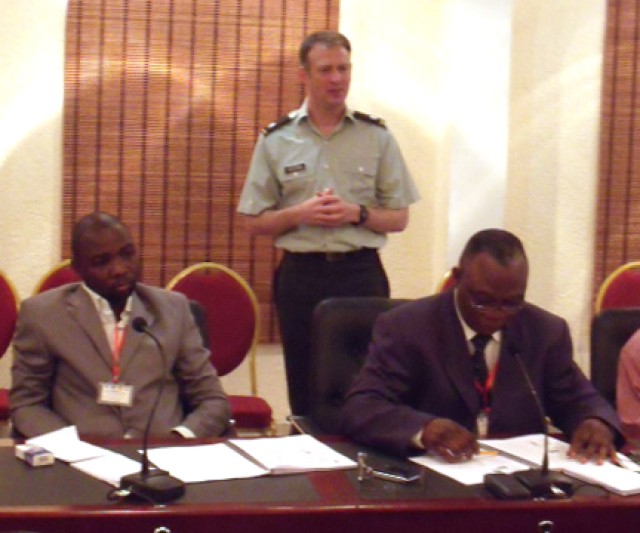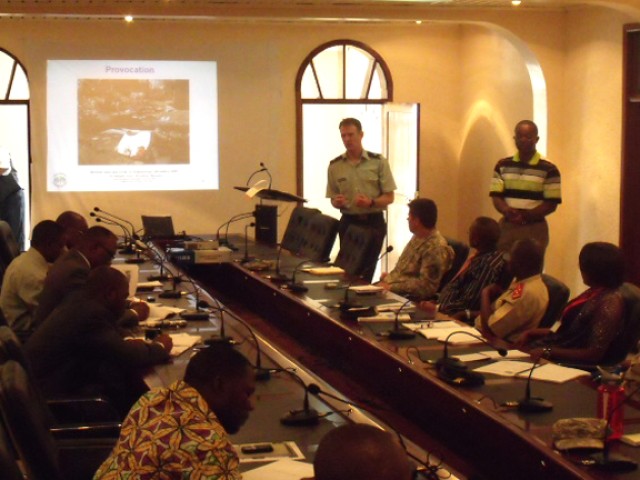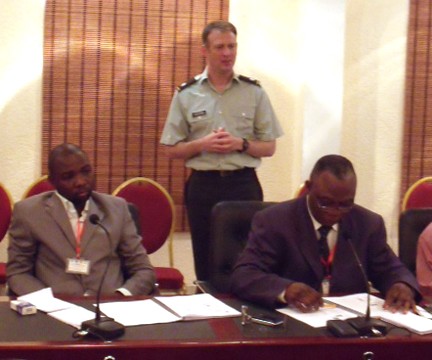VICENZA, Italy Aca,!" Lt. Col. Stephen Salerno, Judge Advocate for U.S. Army AfricaAca,!a,,cs (USARAF) Office of the Staff Judge Advocate (OSJA) recently provided a week of stability-focused legal instruction in Goma, Democratic Republic of Congo (DRoC).
The weeklong event, hosted by the Defense Institute for International Legal Studies (DIILS), included classes on refugee rights under international law; internal armed conflict and the law; and counter-insurgency doctrine. DIILS is the lead Department of Defense security cooperation resource for professional legal education, training and rule-of-law programs.
African participants included military, legal and government representatives from DRoC, Tanzania and Burundi. The regional seminar addressed issues such as border security and combating terrorism, Salerno said.
The choice of Goma, located in the eastern DRoC province of Kivu, as the location for the event was ideal for a seminar addressing border security issues, because it is adjacent to Rwanda and shares boundaries with Burundi, Tanzania and Uganda.
The area is strategically significant in its regional context because counterinsurgent groups are believed to operate there, he said.
Along with Salerno, seminar instructors from the Center for Civil and Military Relations, U.S. Customs and Border Patrol, and the U.S. Coast Guard lead sessions.
Since the predominant language in DRoC is French, instructors were forced to adapt by communicating with their students through an interpreter.
"My first thought was that the translators would slow us down, but in actuality the pace permitted the instructors to emphasize certain points, and provided time to observe the participants reactions," Salerno said. "The benefit was that the short gap in time provided the instructors opportunities to reiterate certain points, or to pause for questions. Judging by the frequent questions and engagement of the participants, using interpreters may have improved the quality of the seminar."
The course of instruction was the second, follow-on iteration of a two-phase program, and took into account topics that were developed during the first phase, including the difficulty in controlling porous borders and addressing security concerns with a lack of resources. The seminar also paved the way-ahead for future sub-regional programs addressing rule of law, anti-corruption and anti-terrorism considerations, Salerno said.
Hosting instructive programs such as the DIILS seminar will allow DRoC and neighboring countries in Eastern Africa develop the mutual trust necessary to enable collective action in response to internal domestic challenges as well as combating terrorist threats, he said.
Salerno is a U.S. Army Reserve officer assigned to the 91st Legal Support Office with previous experience traveling and teaching in Africa, and an easy choice to fulfill the DIILS mission requirements. In his civilian capacity, he is a labor and employment attorney for USARAF OSJA in Vicenza, Italy.
USARAF's mission is to promote security, stability and peace with African land force partners. Conducting programs such as the DIILS initiative will enable USARAF to meet these goals while providing the resources and guidance needed to achieve additional common African and American objectives, Salerno said.
"DIILS and similar programs will allow American and African forces to build a better understanding of the issues confronting them, proposed solutions, and the development of capacity to adequately address them," he said.
Related Links:
Follow U.S. Army Africa on Twitter
Join the U.S. Army Africa conversation on Facebook
View U.S. Army Africa photos on Flickr




Social Sharing